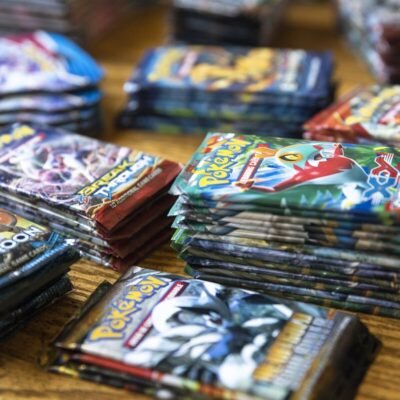LAS VEGAS — Whether it’s owner Ryan Smith’s contagious drive, the excitement of adding two centers in the first round of the NHL draft, or the new blue suit, tie and Utah Hockey Club pin on his lapel he wore, general manager Bill Armstrong woke up energized on Saturday.
“I woke up this morning after I slept for a good two minutes and I said, `Let’s shock the world,’” Armstrong said.
Shock might be a stretch, but the NHL’s newest market in Salt Lake City — where the Arizona Coyotes relocated in April — made its presence felt during the second and final day of the seven-round draft at the Sphere.
Barely 10 picks into the second round, Utah completed two trades minutes apart in addressing its defensive needs with established veterans. The team first acquired two-time Stanley Cup champion Mikhail Sergachev from Tampa Bay in a blockbuster, followed up by acquiring John Marino from New Jersey.
“I’m not sure if in your fourth year of going through the rebuild and totally taking it down and bringing it back that you can get there,” Armstrong said, of how much closer he regarded Utah to be a contender. “But it’s a step in the right direction.”
The club entered the draft with 13 picks, and Armstrong delivered on his intention to use some of them as assets. After using the team’s first pick by selecting forward Tij Iginla — son of Hall of Famer Jarome Iginla — at No. 6, Armstrong traded three picks to Colorado in moving up 14 spots to select center Cole Beaudoin at No. 24.
Whatever constraints existed for Armstrong in Arizona under former Coyotes owner Alex Meruelo have been lifted by Smith. The 46-year-old made his fortune in the tech industry, and now is transforming Utah’s sports landscape as owner of the NBA Jazz, MLS team Real Salt Lake, while also heading a bid to land the 2034 Winter Games.
Smith all but telegraphed Utah taking a more aggressive approach a day earlier when asked to assess his team’s gradual rebuilding timeline.
“I like the position that we’re in,” Smith said. “And so I think that’s something that we’re always checking in on. And that’s the plan, until it’s not the plan.”
A day later, Armstrong’s plan has shifted noticeably into the fast lane.
A buzz rippled through the crowd when NHL deputy commissioner Bill Daly announced the Sergachev trade early in the second round. Utah sent defenseman J.J. Moser, forward prospect Conor Geekie, a 2025 second-rounder and the 199th pick in this year’s draft.
Daly was back at the microphone not long after to inform fans and the rest of hockey that Utah was not done, getting Marino and the 153rd pick from the Devils for No. 49 and Edmonton’s second-rounder in 2025.
“We gave up a two-time Stanley Cup-winning stud 26-year-old No. 1 defenseman, and that’s not easy to do,” Lightning GM Julien BriseBois said. “Kudos to Bill Armstrong and his group in Utah for acquiring such a fabulous young player.”
The Lightning are the team entering a rebuild three seasons since winning their second straight Stanley Cup. Trading Sergachev, who is signed through 2031, saved them an annual $8.5 million salary cap hit. They also dealt forward Tanner Jeannot to Los Angeles.
And the Lightning stand to lose captain Steven Stamkos, who is still on course to become a free agent on Monday, BriseBois and agent Don Meehan confirmed on Saturday.
Overall, Day 2 of the draft featured 22 trades, involving 15 players and 52 draft picks.
The Washington Capitals acquired goalie Logan Thompson from Vegas, and dealt fourth-line winger Beck Malenstyn to Buffalo. Pittsburgh acquired forward Kevin Hayes and a 2nd-round pick in the 2025 NHL Draft from St. Louis for future considerations.
The Toronto Maple Leafs gave up a 2026 seventh-round pick to acquire defenseman Chris Tanev from Dallas, with a belief they can sign the 15th-year player before he’s eligible to enter free agency.
Though Smith and Armstrong cautioned they would not be free-spenders once free agency opens on Monday, that didn’t mean they weren’t going to improve the team in other ways during the two-day draft weekend.
In Arizona, the Coyotes were known for being in a perennial rebuilding mode in making the playoffs just once in the past 12 years, while relocating from one arena to another before finally moving north.
It’s a whole new world in Utah, where the so-called Hockey Club (for this season) has already generated 30,000 season-ticket deposits for a made-for-basketball facility, the Delta Center, with a seating capacity of 16,200 for hockey — and not all directly facing the ice. A permanent name is coming before 2025-26, with Utah HC, Blizzard, Mammoth, Outlaws, Venom and Yeti the six possibilities.
“We’re the youngest state (by demographic), and we’re also the fastest growing. So if you look at both of those metrics, that’s something the NHL is going to be able to look at and say, ‘Wow, like we made the right move,’” Smith said.
For Smith, it’s a matter of balancing his enthusiasm and patience.
“You’re managing polar opposite emotions at all times. Like, you want to win now, but you want to win for the long term. And you want to create this culture,” he said. “But we’re young, and the future looks really bright.”
Brighter still after this weekend.
___
AP Hockey Writer Stephen Whyno contributed to this report.
___
AP NHL: https://apnews.com/hub/nhl





